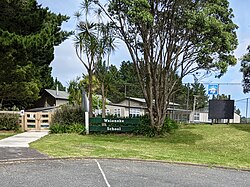Waioneke
Waioneke | |
|---|---|
 Waioneke School | |
 | |
| Coordinates: 36°32′30″S 174°18′05″E / 36.54167°S 174.30139°E | |
| Country | New Zealand |
| Region | Auckland Region |
| Ward | Rodney Ward |
| Community board | Rodney Local Board |
| Subdivision | Kumeū subdivision |
| Electorates | |
| Government | |
| • Territorial Authority | Auckland Council |
| • Mayor of Auckland | Wayne Brown |
| • Kaipara ki Mahurangi MP | Chris Penk |
| • Te Tai Tokerau MP | Mariameno Kapa-Kingi |
Waioneke is a locality on the Te Korowai-o-Te-Tonga Peninsula of the Kaipara Harbour, in the Rodney District of New Zealand. Parakai is 22 km to the south-east, and the road continues another 14 km to the north-west. Rangitira Beach and Woodhill Forest are to the west, and Omokoiti Flats and the southern Kaipara Harbour are to the east.[1][2]
History
[edit]A Māori pā existed at Waioneke prior to European settlement of the area.[3] The Waioneke block was taken up in 1868 by Daniel Pollen (who later became Premier of New Zealand) and William Spearman Young, to graze cattle.[4][5]
A Waioneke Road Board was formed after 1884, and was responsible for forming and maintaining roads over much of the South Head peninsula. The board was dissolved by 1899.[6]
Waioneke was a centre of gum digging from 1880 to 1900.[7]
Deer farming began in the area in the 1970s, and a processing plant was built in Waioneke.[8]
The Kaipara Estate winery began in the Waioneke Valley in 1995.[9][10]
Demographics
[edit]Waioneke is in an SA1 statistical area which covers 18.15 km2 (7.01 sq mi).[11] The SA1 area is part of the larger South Head statistical area.[12]
| Year | Pop. | ±% p.a. |
|---|---|---|
| 2006 | 102 | — |
| 2013 | 114 | +1.60% |
| 2018 | 183 | +9.93% |
| 2023 | 186 | +0.33% |
| Source: [13][14] | ||
The SA1 statistical area had a population of 186 in the 2023 New Zealand census, an increase of 3 people (1.6%) since the 2018 census, and an increase of 72 people (63.2%) since the 2013 census. There were 99 males and 90 females in 66 dwellings.[15] 1.6% of people identified as LGBTIQ+. The median age was 49.7 years (compared with 38.1 years nationally). There were 33 people (17.7%) aged under 15 years, 30 (16.1%) aged 15 to 29, 87 (46.8%) aged 30 to 64, and 36 (19.4%) aged 65 or older.[14]
People could identify as more than one ethnicity. The results were 93.5% European (Pākehā), 11.3% Māori, 1.6% Pasifika, and 4.8% Asian. English was spoken by 98.4%, Māori language by 1.6%, and other languages by 6.5%. No language could be spoken by 1.6% (e.g. too young to talk). The percentage of people born overseas was 9.7, compared with 28.8% nationally.
Religious affiliations were 16.1% Christian, 1.6% Buddhist, and 1.6% New Age. People who answered that they had no religion were 77.4%, and 6.5% of people did not answer the census question.

Of those at least 15 years old, 15 (9.8%) people had a bachelor's or higher degree, 93 (60.8%) had a post-high school certificate or diploma, and 48 (31.4%) people exclusively held high school qualifications. The median income was $32,900, compared with $41,500 nationally. 12 people (7.8%) earned over $100,000 compared to 12.1% nationally. The employment status of those at least 15 was that 84 (54.9%) people were employed full-time and 27 (17.6%) were part-time.[14]
Education
[edit]Waioneke School is a coeducational full primary (years 1–8) school with a roll of 99 students as of November 2024.[16][17] The school traces its origins to Mairetahi School, established in 1928. The school moved to its present site and took its current name in 1938.[18]
Notes
[edit]- ^ Peter Dowling, ed. (2004). Reed New Zealand Atlas. Reed Books. pp. map 11. ISBN 0-7900-0952-8.
- ^ Roger Smith, GeographX (2005). The Geographic Atlas of New Zealand. Robbie Burton. pp. map 34. ISBN 1-877333-20-4.
- ^ Jennings, Jesse David (1979). The Prehistory of Polynesia. p. 244. ISBN 0-674-70060-0.
- ^ Sheffield, Colleen M. (1963). Men Came Voyaging. p. 78.
- ^ Ryburn, Wayne (1999). Tall Spars, Steamers & Gum. p. 21. ISBN 0-473-06176-7.
- ^ Ryburn, p 89
- ^ Ryburn, p 132
- ^ "South Head". Helensville Pioneer Museum. Retrieved 10 October 2008.
- ^ "Kaipara Estate - History". Retrieved 10 October 2008.
- ^ "Kaipara Estate - People". Retrieved 10 October 2008.
- ^ "ArcGIS Web Application". statsnz.maps.arcgis.com. Retrieved 15 May 2022.
- ^ 2018 Census place summary: South Head
- ^ "Statistical area 1 dataset for 2018 Census". Statistics New Zealand. March 2020. 7001252.
- ^ a b c "Totals by topic for individuals, (RC, TALB, UR, SA3, SA2, Ward, Health), 2013, 2018, and 2023 Censuses". Stats NZ – Tatauranga Aotearoa – Aotearoa Data Explorer. 7001252. Retrieved 3 October 2024.
- ^ "Totals by topic for dwellings, (RC, TALB, UR, SA3, SA2, Ward, Health), 2013, 2018, and 2023 Censuses". Stats NZ – Tatauranga Aotearoa – Aotearoa Data Explorer. Retrieved 3 October 2024.
- ^ "New Zealand Schools Directory". New Zealand Ministry of Education. Retrieved 1 January 2025.
- ^ Education Counts: Waioneke School
- ^ "Waioneke School History". Waioneke School. Retrieved 7 October 2008.
